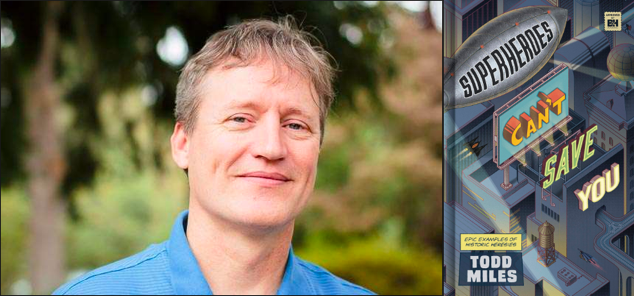Jesus and Superheroes: Creatively Teaching Theology (Author Interview)
SeanMcDowell.org
Professor Todd Miles has written a fascinating book called Superheroes Can’t Save You: Epic Examples of Historic Heresies. The goal of the book, as you can see below, is to use examples of modern superheroes to teach good Christology. As a fan of both superheroes and theology, I love what Dr. Miles is doing. In fact, I wish I had come up with the idea myself!
Check out the brief interview below and consider getting a copy of professor Miles’ excellent book (and teach it to some young people while you're at it!).
SEAN MCDOWELL: What motivated you to write a book on theology through the lens of superheroes?
TODD MILES: I wanted to get good Christology into the hands of people who might not ordinarily pick up a book on Christology. I had been teaching Christology and Church history for over a decade. I found that the best way to describe the Christological heresies was through Superhero analogies – that many of the Christological heresies are embodied in a comic superhero. The analogies worked great in the classroom both for their explanatory power and for being memorable. I tried it out in a Sunday School class that had ages ranging from teen to octogenarian and it worked great. When an elderly woman approached me some months later, told me she had seen an advertisement for the first Ant-Man movie, and remembered that was modalism, I thought this might make a good book.
MCDOWELL: Can you tell me about your approach and what makes it unique?
MILES: There have been lots of good books written on the Christological heresies. What makes my book unique is that I illustrate each of seven heresies with a familiar comic superhero. Studying the heresies is important because is so doing, we are required to think better about who Jesus Christ is. I work through the biblical teaching on the person of Jesus, explaining where each heresy goes wrong and why heretical views posit a Jesus that ultimately cannot do many of the things that Jesus did and does. The main point of the book is that in order for Jesus to do all that the Bible says that he did and does, he must be everything that the Bible says that he is. Ultimately, the gospel and all the work of Christ requires him to be fully human and fully divine. I have tried to make the book lively and engaging, and people will learn some church history along the way.
MCDOWELL: What is your favorite example of a theological heresy that can be seen in a superhero? Can you explain?
MILES: My favorite illustration is the Superman analogy with Docetism. In the comic book world, there is no human named Clark Kent. Clark is really Superman in disguise, not human at all. In the same way, Docetism argues that Jesus just seemed to be human. He was really God in disguise, not human at all. This is probably my favorite because I have noticed that many evangelicals are so quick to depend the deity of Christ (and rightly so), that they are not sure what to do with his humanity. People may not claim to believe in Docetism, but, functionally, they have a docetic view of Christ. The humanity of Jesus is every bit as necessary for our salvation and Christ’s redemptive work as his deity. A Jesus that just seems to be human cannot save us.
MCDOWELL: Is there any superhero that best captures the biblical image of Christ? If so, who? And if not, why not?
MILES: By their very nature, comic superheroes save people from a variety of evils and disasters. That is what makes them fun and popular. But no superhero can do all that Jesus does because none of them are who Jesus is. What is fun about the superhero comics and movies is how the best storylines are often messianic. I think those narratives demonstrate that the human quandary is so pronounced that the stories that really last, the stories that speak to us, are stories that are going to borrow from the familiar biblical plot-lines. It’s fun to read and watch for them. Even the latest superhero movie, Aquaman, declares that a King only fights for his people, but a hero fights for everybody. Christians should hear that and think, “I know somebody who is like that, but even greater!”
MCDOWELL: How do you envision the book being used?
MILES: My target audience was those who know and like the superheroes and want to learn some good Christology. But the superheroes are only illustrations; the book is about Jesus Christ. Therefore, you do not have to be a comic geek to enjoy and profit from the book. The superheroes are so familiar that most will understand the illustrations. And I provide enough back story to each superhero that the illustrations will work even if someone has never read a comic book. anybody can profit from reading it. Several churches who are using it in youth groups, adult Sunday School classes, book groups, men’s retreats, etc. It is also used in Bible Colleges and Seminaries, but that should not intimidate people. I wanted the book to be engaging, accessible, funny (most of the footnotes are jokes), and devotionally heart-warming.

